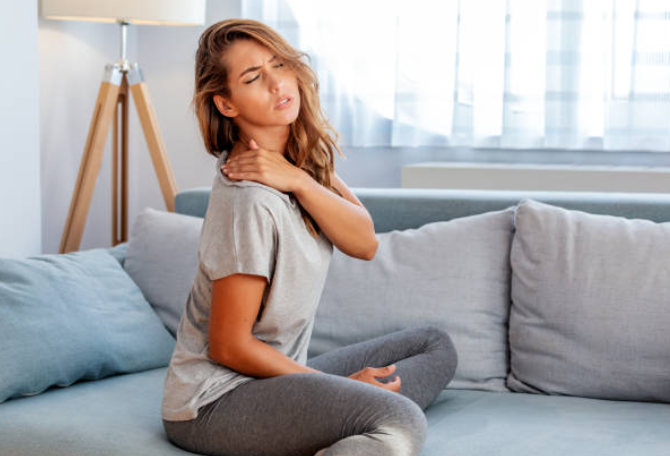Do you suffer from tight neck muscles after work? Do you complain about neck stiffness after a workout? Is it sore to turn your head? The trapezius is a large diamond shape muscle located in your upper back. This muscle is often blamed for being the culprit of tight neck muscles. However, this notion is often misunderstood. In this blog we will explore the myths associated with upper trapezius tightness and unravel the actual reason for tight neck muscles.
Myth 1: We need to fix that poor posture: We hear this all the time, you need to stop rounding your back and avoid sticking your neck out! I’m not saying that posture can’t be the reason for your stiff neck but it is a lot more complex than just fixing your posture. It is often the prolonged position on sitting that is more of a contributor to stiff neck than poor posture. Prolonged sitting position leads to lack of blood flow going through the muscle which can elicit the symptoms of neck stiffness. You’re allowed to sit in a position where you are comfortable, just remember to take frequent breaks and get up to move!
Myth 2: Neck stretches will fix the tightness: Let’s begin by determining the term ‘tightness’, the feeling of being ‘tight’ is a subjective feeling a person experiences when the muscles are being overworked or the muscle is being underutilized. Neck stretches may feel great as it feels like you’re lengthening the muscle. However, this is often just another sensation and does not address the underlying issue of the trapezius muscle being weak. If the muscle continues to be weak then it will always the first muscle to be tight. The better way to fix neck tightness is to have an appropriate progressive strength program. A physiotherapist will be able to help you with this rehabilitation program.
Myth 3: My neck muscles are overactive: This belief is a common story many physiotherapists come across in their clinic. The patient has been led to believe that they have overactive upper trapezius muscles because of their friend at the gym or even another clinician. There is no way to accurately measure overactivation of upper trapezius muscle in the clinic, there is no normative value available to compared the results. We’re are all different, our bodies require different amount of strength capacity due to our environmental factors. Think of an office worker compared to a professional weightlifter, we can agree that their body requires different levels of strength to perform at their job. It is better to think of the term ‘overactive’ as ‘weak’ upper trapezius muscle. The term ‘overactive’ can be detrimental to many people being labelled with the issue. They often will feel that they need to avoid strength training because it will increase the overactivation the muscle. In actual fact, avoiding strength training to an already weak muscle can lead to further deconditioning and may increase the symptoms of neck stiffness.
Remember that tight upper trapezius is often a multi-factorial issue. There are many contributors of it and it is most often not only caused by poor posture or an overactivation of a muscle. Instead, muscular weakness, stress levels, job requirements and belief system can contribute to our overall neck tightness sensation. The good news is that our expert physiotherapists are well equipped in dealing with these types of musculoskeletal situations. They will take a detailed subjective and physical examination to determine the reason for your tightness and provide you with the appropriate advice to get you back on your feet and performing your best in your everyday activities.

